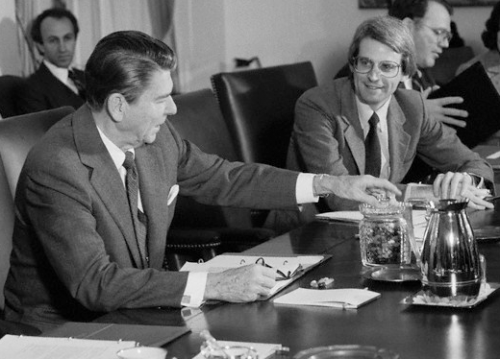In his frothing and scattershot New York Times op-ed piece, onetime Reagan budget director David Stockman isn’t wrong about everything. That’s because when you essentially say that everything is horrible, you’re bound to be right some of the time. It’s one of the loonier things to appear in the Times in recent memory, ignorant of history–as if the U.S. economic system was just a little “bumpy” before Roosevelt’s New Deal ruined it all–and dishonest about government investment (the Internet, which was shepherded by the public sector, seems to have grown sort of popular). An excerpt:
“So the Main Street economy is failing while Washington is piling a soaring debt burden on our descendants, unable to rein in either the warfare state or the welfare state or raise the taxes needed to pay the nation’s bills. By default, the Fed has resorted to a radical, uncharted spree of money printing. But the flood of liquidity, instead of spurring banks to lend and corporations to spend, has stayed trapped in the canyons of Wall Street, where it is inflating yet another unsustainable bubble.
When it bursts, there will be no new round of bailouts like the ones the banks got in 2008. Instead, America will descend into an era of zero-sum austerity and virulent political conflict, extinguishing even today’s feeble remnants of economic growth.
THIS dyspeptic prospect results from the fact that we are now state-wrecked. With only brief interruptions, we’ve had eight decades of increasingly frenetic fiscal and monetary policy activism intended to counter the cyclical bumps and grinds of the free market and its purported tendency to underproduce jobs and economic output. The toll has been heavy.
As the federal government and its central-bank sidekick, the Fed, have groped for one goal after another — smoothing out the business cycle, minimizing inflation and unemployment at the same time, rolling out a giant social insurance blanket, promoting homeownership, subsidizing medical care, propping up old industries (agriculture, automobiles) and fostering new ones (‘clean’ energy, biotechnology) and, above all, bailing out Wall Street — they have now succumbed to overload, overreach and outside capture by powerful interests. The modern Keynesian state is broke, paralyzed and mired in empty ritual incantations about stimulating ‘demand,’ even as it fosters a mutant crony capitalism that periodically lavishes the top 1 percent with speculative windfalls.
The culprits are bipartisan, though you’d never guess that from the blather that passes for political discourse these days.”
Tags: David Stockman

